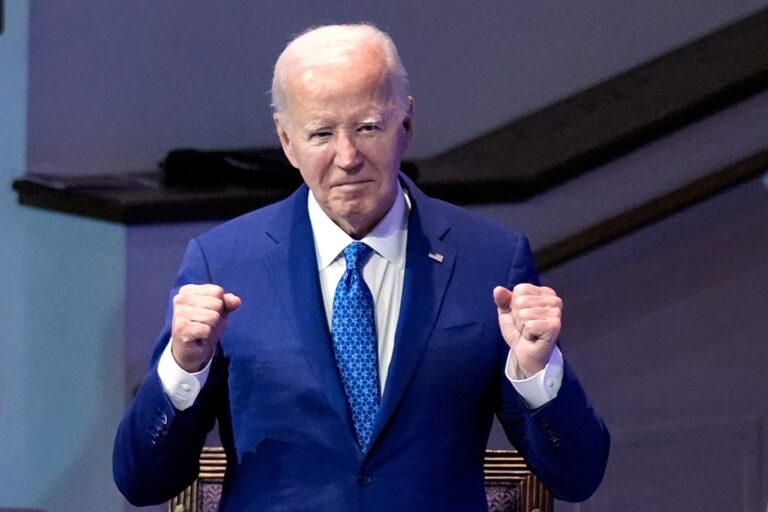As lawmakers consider whether Biden should stay in office or step down, no easy answers seem in sight.
It’s a delicate and deeply precarious juncture for the president’s party. Democrats who worked with Biden for years, if not decades, and cherished his life’s work on policy priorities are now left with awkward questions about his political future, which are on full display this week in Washington as Biden hosts world leaders for a NATO summit.
With time not on their side, with just a month until the Democratic National Convention and a week before Republicans gather in Milwaukee to renominate Trump as their presidential candidate, many Democrats say attention should be focused on the former president’s felony conviction in the hush-money case and pending federal charges over his attempt to overturn the results of the 2020 election.
This is what Biden himself might call a tipping point. While Biden remains adamant that he will step aside only if God almighty so commands, Democrats in the House and Senate are deciding how hard they will fight to force the president to change course, or if they want to change course at all.
House Democratic Leader Hakeem Jeffries plans to convene lawmakers privately to “gather consensus” before announcing his intentions, according to a person familiar with the matter who asked not to be identified. Jeffries plans to convene a meeting on Monday with Democrats with the slimmest chances of reelection.
But a closed-door conference call on Sunday of about 15 ranking House committee members revealed the growing rift, with at least four more Democrats – Reps. Jerrold Nadler of New York, Jim Himes of Connecticut, Adam Smith of Washington state and Mark Takano of California – saying privately that Biden should resign.
As the most senior member on the call, Nadler was the first to speak up and say Biden should step aside, according to a person familiar with the call who spoke on condition of anonymity, knowing full well that his seniority meant others could step aside as well.
Many others on the call stopped short of saying Biden should withdraw from the election, but expressed concerns about his competency and chances of reelection.
Additionally, other lawmakers, including Rep. Maxine Waters of California and Rep. Bobby Scott of Virginia, leaders of the House Black Caucus, also spoke strongly in support of Biden, as did Rep. Richard Neal of Massachusetts, the top Democrat on the powerful Ways and Means Committee.
And several lawmakers appeared frustrated that leadership had not offered a direction or path forward, according to people familiar with the call, with one Democrat saying that whatever the decision is, the situation “has to end now,” one of the people said.
Neal then said that ultimately, Biden beat Trump in 2020 and “will win again in November.”
The chaos is also testing a new generation of leaders led by Jeffries and Senate Majority Leader Chuck Schumer, the New Yorkers who have refrained from publicly dictating the way forward in order to balance the diversity of views among lawmakers.
Behind the scenes, Speaker Emeritus Nancy Pelosi has been taking calls from lawmakers seeking her advice on the situation, and is widely seen as the person to watch for any final decisions about Biden’s future given her closeness to the president and her skill at counting votes in partisan politics.
Pelosi said last week that Biden’s debate performance raised “legitimate” questions that Biden should answer, but she has not changed her support for the president. And Biden called her last week when he reached out to other party leaders.
While Biden’s primetime interview on ABC on Friday did little to calm anxious Democrats and some said it made the situation worse, Pelosi publicly praised him on social media as “a great president who continues to put money on the table for America,” adding, “We’re not done yet!”
Schumer has kept a low profile throughout the ordeal, but he will convene Democratic senators for their weekly lunch on Tuesday, where lawmakers are sure to offer a range of views.
Democratic Sen. Mark Warner of Virginia had planned to convene senators privately on Monday to discuss Biden, but a person familiar with his thinking said the discussion would take place at a regular caucus lunch with all Democratic senators on Tuesday.
“It’s time to stop worrying and get back to going door-to-door,” said Sen. Alex Padilla of California, another Democrat.
Padilla met with Biden over the weekend and urged the campaign to “let Joe be Joe.”
“Given the debates, I don’t think the campaign has a choice,” Padilla said Sunday, explaining that Biden needs to hold town hall meetings and unscripted events to show voters “the Joe Biden that I know and the Joe Biden that most Americans grew up to love.”
While some deep-pocketed donors may be uncomfortable, strategists for House and Senate races said both chambers have raised more money than ever before because donors see congressional Democrats as a “firewall” and the last line of defense against Trump.
House Democrats are having their biggest fundraising day ever, raising $3 million after last Friday night’s debate between former President Barack Obama and Jeffries in New York City. That’s on top of the $1.3 million that flowed into the Democratic Congressional Campaign Committee during and immediately after the debate.
Senate Democrats are also seeing a “surge” in support, according to a national Democrat who is familiar with the Senate election.
As Democratic candidates campaign alongside Biden, they are being advised to focus on building their own brands and amplifying the impact of their work in Congress on their home districts.
Associated Press writers Farnoosh Amiri, Kevin Freking and Mary Claire Jalonick contributed to this report.

